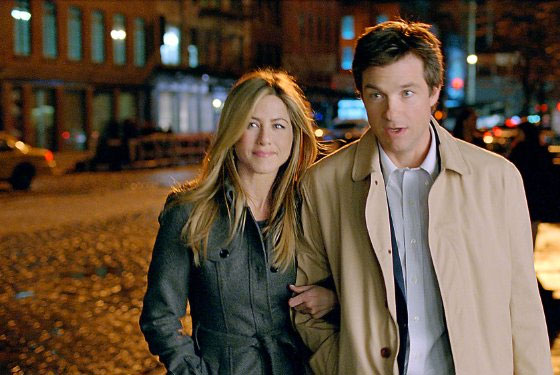
Tomorrow The Switch, starring Jason Bateman, Jennifer Aniston, and some sperm, arrives in theaters. It’s the third artificial-insemination movie of the last six months, following the excellent lesbians-with-family Sundance breakout The Kids Are All Right and Jennifer Lopez’s trifling The Back-Up Plan. These films have all luxuriated in the absurdities of artificial insemination — exploring, respectively, what happens when: your best friend is your accidental sperm donor; your sperm donor wants to be part of your clan; you meet Mr. Right, right after you meet your sperm donor’s sperm. Is this a brave, new romantic-comedy world, one in which women don’t need fathers to make a family? Bill O’Reilly worries it is. He recently got worked up about Jennifer Aniston’s comment that, “Women are realizing it more and more, knowing that they don’t have to settle with a man just to have that child.” In response, he spluttered, “She’s throwing a message out to 12- and 13-year-olds, that hey, you don’t need a guy. Dad, ehhh. And that’s destructive to our society.” But if O’Reilly sat down and watched The Switch, he’d see that, at its core, it’s just as old-fashioned as he is. It may have some of the trappings of a female-empowerment saga, but ultimately it chickens out and grabs the nearest dad.
While The Switch (once called The Baster) is clearly not anti-sperm-donation, it is, as much as any “family values” conservative, pro the two-parent family. In the movie, Aniston makes the decision to use a donor, and then unknowingly impregnates herself with good friend Jason Bateman’s sperm. The movie picks up years later — skipping past the very years when Aniston’s character is ably raising a child alone — just in time for Aniston’s character to find a dad. Bateman’s character figures out he’s the father, and after many high jinks, (SPOILER ALERT, although you probably know what’s coming) convinces Aniston he’s the man for her. Yes, he’s adorable and all Jason Bateman–y, but one of his best, most suitable qualities — his ultimate rightness — is the fact of his paternity. In The Switch, Prince Charming is a real dad, and the happy ending is a two-parent family. (Also the happy ending, give or take a dad, of The Back-Up Plan and The Kids Are All Right). Bill O’Reilly should approve!
Another not-so-liberal aspect of the seemingly open-minded artificial-insemination movie (The Kids Are All Right gets a pass here): less sex. The women, after all, are using a baster. Jennifer Aniston’s character isn’t in the midst of a paternity kerfuffle because she slept with two dudes, and oops, doesn’t know which one knocked her up. (That would really give O’Reilly something to talk about.)
Avoiding sex is something sperm donor movies have been doing since at least 1993 (i.e. we’re just as uptight now about sex– though not two-mother families!-- as we were then.) In Made in America — the movie in which Whoopi Goldberg might have accidentally used a white guy’s stuff to have a baby — Goldberg hadn’t actually had sex with said white guy (Ted Danson) and just, God forbid, forgotten about it. Just like Aniston, her sperm-donor-related predicament was far more chaste than your average sperm-related predicament.
Movies about mothers with paternity problems not caused by artificial insemination — but by actual sex — tend to be dramas, ebullient camp-fests like Mamma Mia! (where standard judgementalness need not apply), or, as in the case of eighties sitcom My Two Dads, a show that features a dead mother. In Look Who’s Talking, Kirstie Alley knows who her baby daddy is — but she still tells people she was artificially inseminated, rather than confess to having an affair with a married man. Sure, that movie is from 1989, but it shares a message with The Switch: artificial insemination, it’s the less promiscuous choice! Just, in the movies, not really the more progressive one.

